
Jean-Baptiste-Joseph Duchesne (1770, Gisors, Eure - 1856, Paris) was a French painter and miniaturist.
He became known after the exposition of 1804 and was a royal painter during Restoration. His works are quite realistic.

Jean-Baptiste-Joseph Duchesne (1770, Gisors, Eure - 1856, Paris) was a French painter and miniaturist.
He became known after the exposition of 1804 and was a royal painter during Restoration. His works are quite realistic.
Jean-Baptiste-Joseph Duchesne, known as Duchesne de Gisors, a French painter of miniatures and enamels, was born at Gisors in 1770. He was the son of Jean Baptiste Duchesne, a sculptor, and a pupil of Vincent. He exhibited at first under the name of Duchesne, afterwards under that of Duchesne des Argillers, and finally, from 1833 until his death, under that of Duchesne de Gisors. He died at Gisors in 1856.

The Hôtel des Invalides, commonly called Les Invalides, is a complex of buildings in the 7th arrondissement of Paris, France, containing museums and monuments, all relating to the military history of France, as well as a hospital and an Old Soldiers' retirement home, the building's original purpose. The buildings house the Musée de l'Armée, the military museum of the Army of France, the Musée des Plans-Reliefs, and the Musée d'Histoire Contemporaine. The complex also includes the former hospital chapel, now the national cathedral of the French military, and the adjacent former Royal Chapel known as the Dôme des Invalides, the tallest church building in Paris at a height of 107 meters. The latter has been converted into a shrine of some of France's leading military figures, most notably the tomb of Napoleon.
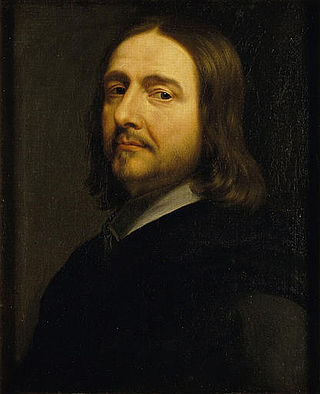
Philippe de Champaigne was a Brabançon-born French Baroque era painter, a major exponent of the French school. He was a founding member of the Académie royale de peinture et de sculpture in Paris, the premier art institution in the Kingdom of France in the eighteenth century.
The Hébertists, or Exaggerators, were a radical revolutionary political group associated with the populist journalist Jacques Hébert, a member of the Cordeliers club. They came to power during the Reign of Terror and played a significant role in the French Revolution.
Events from the year 1856 in art.

François Pascal Simon Gérard, titled as Baron Gérard in 1809, was a prominent French painter. He was born in Rome, where his father occupied a post in the house of the French ambassador, and his mother was Italian. After he was made a baron of the Empire in 1809 by Emperor Napoleon, he was known formally as Baron Gérard.
Events from the year 1770 in art.
Events in the year 1819 in Art.
Events from the year 1785 in art.

The Diocese of Nevers is a Latin Church diocese of the Catholic Church in France. The diocese comprises the department of Nièvre, in the Region of Bourgogne.
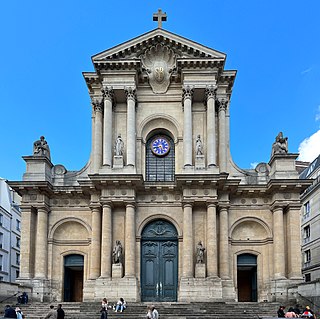
The Church of Saint-Roch is a 17th–18th-century French Baroque and classical style church in Paris, dedicated to Saint Roch. It is located at 284 rue Saint-Honoré, in the 1st arrondissement. The current church was built between 1653 and 1740.
Events from the year 1856 in France.
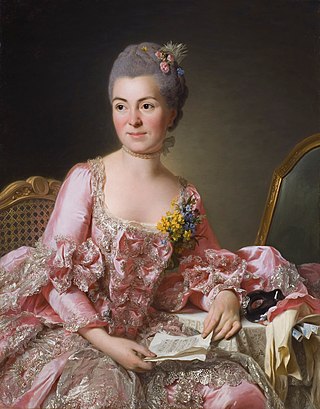
Marie-Suzanne Giroust, known as Madame Roslin, was a French painter, miniaturist, and pastellist, known for her portraits. She was a member of the Académie royale de peinture et de sculpture. Only a small number of her works have been identified.

Jean Joseph Eleonora Antoine Ansiaux (1764–1840) was an Austrian Netherlands-born historical and portrait painter who worked in France.
John Baptist Chatelain (1710–1758) was an English draughtsman and engraver of French background, specialized in landscapes.

Jean-Baptiste Charles Claudot was a French painter and decorator. He specialized in landscapes, many of which featured ruins.
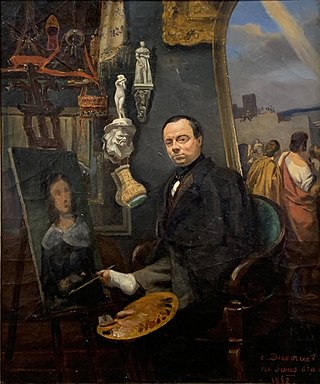
Louis Joseph César Ducornet was a French painter who painted with his foot. He is known primarily for biblical and historical scenes, as well as portraits.

Jean-Baptiste Henri Durand-Brager (1814–1879) was a French painter, noted for his marine scenes and Orientalist works.
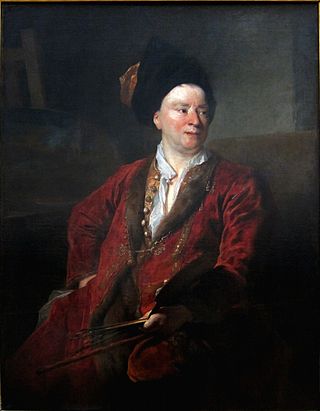
Jean-Baptiste Forest was a French landscape painter.

Louis Lafitte was a French painter, designer, illustrator and muralist.